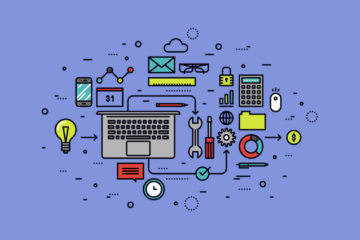Top 5 Tech Tools Every Branding Expert Needs in 2025

In the fast-paced world of branding, staying ahead means staying equipped with the right tools. As we enter 2025, technology continues to redefine how brands are built, communicated, and managed. Whether you’re a seasoned branding expert or a budding entrepreneur, leveraging cutting-edge tools can streamline your workflow, enhance creativity, and ensure your branding strategies resonate with your audience. Here are the top five tech tools every branding expert needs to thrive in 2025.
1. Adobe Creative Cloud: AI-Powered Design Revolution
Adobe Creative Cloud remains an essential suite for branding professionals in 2025, with new AI-powered features making it more indispensable than ever. Tools like Adobe Photoshop and Illustrator now integrate advanced generative AI, allowing branding experts to create stunning visuals with minimal effort.
For example:
• Generative Fill in Photoshop helps refine images effortlessly.
• Illustrator’s vector-based AI tools simplify complex logo designs and branding assets.
Beyond design, Adobe’s Creative Cloud Libraries ensure seamless collaboration across teams. Assets can be shared and updated in real time, allowing branding projects to stay consistent and on-brand, no matter the team size.
Pro Tip: Use Adobe Express for quick social media branding templates and fast turnarounds, especially for stories and reels.
2. Canva: Empowering Non-Designers with Professional Branding
Canva has cemented its place as the go-to tool for branding professionals who want speed and accessibility. In 2025, Canva Pro’s features have expanded to include advanced Brand Kit options, making it easier than ever to maintain brand consistency.
Key highlights:
• Magic Design: Canva’s AI-driven feature creates entire branding templates based on a single logo upload.
• Video Editing Tools: Perfect for crafting short, on-brand promotional videos.
• Collaborative Workspaces: Teams can work together in real-time, ensuring cohesive branding even when working remotely.
Canva’s integration with popular tools like Slack, HubSpot, and Google Drive makes it an all-in-one branding hub.
3. HubSpot CRM: Branding Meets Data-Driven Insights
In 2025, branding isn’t just about visuals; it’s about creating meaningful, data-backed connections with your audience. HubSpot CRM is a must-have tool that helps branding experts understand their audience, personalize messaging, and measure brand performance.
Why it’s a game-changer:
• Advanced Analytics: HubSpot’s tools let you track your brand’s performance across multiple channels, from email campaigns to social media.
• AI-Powered Personalization: Automatically tailor branding messages to suit individual customer segments.
• Content Strategy: HubSpot’s content marketing tools provide insights into which branding assets resonate most with your audience.
With HubSpot, branding professionals can merge creativity with data, ensuring campaigns deliver both impact and ROI.
4. Notion: Streamlining Branding Strategies and Collaboration
Notion has become a powerhouse for branding teams in 2025, offering a blend of task management, content planning, and collaboration. With its versatility, Notion is perfect for organizing branding strategies and ensuring teams stay aligned.
Features that stand out:
• Customizable Workspaces: Build project dashboards to manage everything from mood boards to content calendars.
• Templates for Brand Strategy: Use pre-designed templates to quickly outline branding guidelines, client personas, and campaign workflows.
• AI Assistance: Notion AI now helps generate ideas, refine brand messaging, and even draft content for presentations or client pitches.
Notion’s ability to integrate with tools like Slack, Google Drive, and Trello ensures a seamless branding workflow.
5. Figma: Collaborative Design at Its Best
For branding experts, Figma has revolutionized design collaboration. In 2025, it continues to dominate with its focus on real-time teamwork and prototyping. Figma’s browser-based interface ensures that teams can collaborate from anywhere, making it essential for remote or hybrid branding teams.
Why Figma is crucial:
• Interactive Prototyping: Design and test branded experiences (like websites or mobile apps) in one platform.
• Brand Asset Management: Store reusable brand components such as logos, icons, and typography in shared libraries.
• AI Enhancements: Figma’s AI tools now provide suggestions for design elements, improving efficiency and creativity.
Its integration with tools like Slack, Notion, and Miro makes Figma an indispensable part of any branding toolkit.
Final Thoughts: Choosing the Right Tools
Branding in 2025 is more dynamic than ever, blending creativity with data and technology. Whether you’re designing a brand identity, strategizing campaigns, or tracking audience engagement, the right tools can make all the difference.
To recap, here are the top five tech tools you need:
1. Adobe Creative Cloud for professional, AI-enhanced designs.
2. Canva for quick, accessible, and on-brand content creation.
3. HubSpot CRM for data-driven branding strategies.
4. Notion for streamlined project management and collaboration.
5. Figma for collaborative, cutting-edge design.
By incorporating these tools into your workflow, you’ll be better equipped to adapt to the ever-evolving world of branding and create meaningful, lasting impressions in 2025 and beyond.
Which of these tools are you already using? Share your thoughts and experiences in the comments below!







